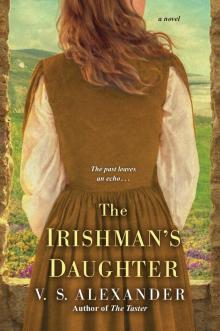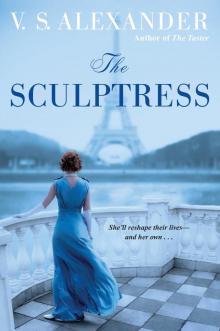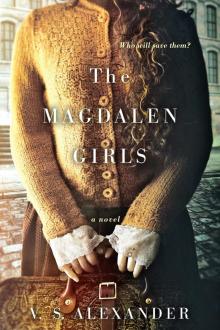- Home
- V. S. Alexander
The Irishman's Daughter Page 3
The Irishman's Daughter Read online
Page 3
But never far from the good times past were the funerals and the keening women. Briana could never forget the sound—a cry like a wounded animal that wound through the air in spirals as ancient and primal as the stars. This was the sound she had heard when the men had drowned. Recently, not sure of her ears, she believed she had heard the plaintive call drifting over the silent fields like an echo on the wind. She feared there would be many more such cries to come.
Briana walked to the window and looked out. The land had changed over the years as the tenant farms expanded around the manor, except on the sloping farm lands to the north. She supposed it was called progress, a use of the land for the greater good. It was certainly all she knew. But now she wondered about progress: She had seen the ravages of the blight herself, touched the wilted leaves, seen the concerned looks of the women as the food diminished, witnessed the exasperation of her father as he failed to collect the rents.
The clop of horses’ hooves jogged Brian from his chair. The square form of the jaunting car, covered in oilcloth to protect its passenger, bounced into view in the circular lane. The driver, clad in a tan overcoat splotched with water, held the reins in his left and a whip in his right. He guided the horse up the lane, the light carriage quivering in the ruts.
Her father rushed to the door. Briana followed him down the steps to the lathering horse.
“Thank you for safely delivering my daughter,” Brian told the driver. “Can I offer you a cup?”
“No, thank you,” the man replied, pressing the rain from his coat. “I must water my horse and return to Belmullet.” Brian directed him to the cistern in back of the house where he could find a bucket, ample water, and patches of grass. The driver thanked him again, telling Brian he wanted to take advantage of the daylight for his journey back. He descended from his wooden perch and unloaded Lucinda’s large trunk on the wet landing.
Briana peered under the oilcloth and saw her sister. Lucinda was twenty, two years older but a woman Briana thought more mature because of her worldly knowledge. She always harbored some jealousy for her sister’s travels, but those thoughts were short-lived when she reflected on her own love of her native land.
Brian peeled back the cloth. A leg covered by an open silk cape and fine satin dress lowered toward the carriage step. Lucinda, smiling, shifted her body, allowing her father to lift her in a graceful sweep to the slate landing of Lear House. At least her sister’s white-buttoned shoes would not get soiled by the damp.
Brian patted the driver’s back. “Let me get your payment.”
Lucinda kissed her father’s cheek and shook her head. “No need, Father. Sir Thomas has taken care of everything.” She spoke in English.
Briana had heard her sister speak English since they were children, but Lucinda’s tone and accent had changed in the past year. Her words held a snobbish affectation that had developed since her sojourns abroad.
The driver snapped the reins. The horse snorted and headed around the pebbled lane to the back of the house. Briana moved closer to her sister. Lucinda’s pale yellow dress, crosshatched with squares and stripes and patterned with white periwinkles within the geometric shapes, blossomed under her black cape. Her matching bonnet was secured to her head by a pale green bow knotted under her strong chin. Her gloves matched the color of the bow. The dress was not brocaded with ruffles in the manner of the highest fashion; in that respect it was simple—a dress in which to travel. But any Irish woman of breeding, let alone the wife of a tenant farmer, would have coveted such an outfit. Briana looked down at her simple, deep yellow skirt; brown bodice; and worn black shoes and felt inadequate in her sister’s suddenly imposing shadow.
Lucinda leaned in and pecked her on the cheek, hesitated for a moment, but then pulled Briana to her waist with a heartfelt squeeze. “It’s so good to see you again, my dear sister. How I’ve missed you, but England was so exciting—”
“Let’s not stand in this weather like we’re daft,” Brian chided. “It’s much more comfortable inside.” He grabbed Lucinda’s trunk by the straps and dragged it up the steps. Briana opened the door for her sister, who stepped inside with the air of an entitled owner.
Lucinda doffed her bonnet and gloves, depositing them on the mahogany entrance table. Like a dutiful father, Brian removed her cape and hung it on the hall tree. Lucinda, her dress buoyed by petticoats, appeared to float across the floor. They followed her into the drawing room, where the ancestral portraits of Blakely’s family hung on the mustard-colored, flowered walls.
“Much better,” Brian said. “I’ll light a fire to keep out the damp.”
Lucinda sank into a chair. “Thank you, Papa. I’m rather tired after my journey. Maybe Margaret can make us some tea.”
Brian looked puzzled. “Didn’t you get my letter?”
Lucinda nodded. “The most recent, a month ago.” She appeared equally puzzled. “Is something wrong?”
He walked to the fireplace and placed several ash logs on the grate. “Apparently, you’ve been shielded from what’s going on. Haven’t you heard?”
Lucinda’s eyes widened as alarm spread across her face. “I’ve heard nothing. Where is Margaret?” She scrutinized the room with narrowed eyes. “And where’s Edmond?”
“Sir Thomas has kept you under a rock,” Briana said impatiently. “Both are gone. Let go, after kind consideration from Mr. Blakely. Father can explain better than I. While he does, I’ll make tea.” She left the drawing room and considered that Lucinda had not received the letter about pardoning the tenants’ debts. That explained why there was no response from her sister. She suspected Sir Thomas must have intercepted the family posts, only to deliver those of the most innocuous nature. Still, she wanted to make no mention of her attempt to sway the landlord for fear of upsetting her father.
Briana walked through the dim hall to the kitchen on the back of the house. With Margaret and Edmond gone since January—a cruel time for anyone to lose their income, especially considering the blight—the manor had taken on an added air of melancholy without their presence. Briana considered Lear House to be most inviting in the spring and summer, when on warm, sunny days the doors and windows could be flung open. Then, light filled the drawing room and the dining room on the opposite side of the hall. Despite that, two rooms remained in darkness on the ground floor: The library was always left in subdued light to protect its books, and the kitchen received little sun through its north windows. On the upper story, Blakely’s bedroom; the Master’s bath, as her father called it; and the guest rooms were also pleasant when opened during the summer. If the owner’s guests were in a festive mood, Lear House could be especially cheerful in its season.
Of the two doors inside the kitchen, the one farthest to the north opened to the sloping hill rising from the back of the house; the other, now chained and padlocked, had served as the entrance to the cramped quarters of the cook and hired man. Those rooms were even more austere than the adjoining cottage where Briana and her family lived.
Dust coated the windows as well as the large oak table in the center of the room. The long iron stove looked equally forlorn having been denied the tender attentions of Margaret. Briana placed several logs on the grate below the cooking rack and scattered them with twigs and loose bark. The air-tight metal box containing the Congreve matches sat nearby. She opened it, and a soft whoosh poured from its interior. She struck a match against the sandpaper. It flared in a smoky haze, and the smell of phosphorous filled her nose. The flame ignited the bark.
Through the small window she saw the jaunting car headed up the hill to the village of Carrowteige, returning to Belmullet. She filled an iron kettle from the cistern and returned to the kitchen. In a few minutes the steamy smell of boiling water filled the room. The tea, teacups, and serving tray were in the oak cupboard. For a moment, she resented her role as “serving girl,” the one her father had spoken of. However, it was a duty thrust upon her, and she couldn’t depend upon her sister to make tea or keep
house.
When Briana returned to the drawing room, her father had lit the fire and moved a small table between the three chairs. She placed the tray on the table and waited for the tea to steep. Lucinda was silent, her attention diverted to the window. The afternoon light faded in the deepening overcast. Gloom settled over the room.
“I had no idea,” Lucinda finally said. “Sir Thomas said nothing of this to me—the dismissal of Margaret and Edmond, the blight . . . However, he’s not required to keep me informed of events in Ireland.” She stopped and pondered for a moment. “He certainly wouldn’t withhold your letters.”
“Wouldn’t he?” Briana asked. “I wrote to you concerning matters here—with no response. You don’t know the half of what has happened.” Briana hated the stiffness of her tone, but Lucinda needed to know the truth. She poured the tea. “No one seems to know what’s causing the potato crop to fail. Mr. Caulfield told me that three hundred smallholders were evicted from Ballinlass in Galway last month so the tenant’s land could be turned into pasture. Perhaps it had nothing to do with the crop, but the Infantry was called in and homes were demolished. Mr. Caulfield has told me of other incidents as well, of struggles in Tipperary. The blight seems to be happening everywhere in Ireland. I fear the worst is yet to come.”
“Rory would know,” her father said. “He appears to have a keen interest in the state of the government.”
Lucinda raised an eyebrow. “Yes . . . more than he should.” She looked at Briana. “London was so bright and gay when Sir Thomas and his friends were there, even on the dullest days. No one in our circle could have imagined such goings-on here.”
Briana sipped her tea and brushed off the slight to Rory. It amazed her that her sister could have heard nothing of the suffering that had overtaken County Mayo since the fall. But, on reflection, perhaps Lucinda was not as heartless as she imagined. Could the letters have been lost in the post even though she took great care in addressing them? She suspected Sir Thomas was to blame. After all, her sister was fulfilling her duties as a governess to the children of a family friend of the owner. Unmarried, Blakely had no children himself, but he did look out for his close acquaintances, particularly those in high places, as her father had pointed out. Blakely needn’t have looked further than to Lucinda and her bookish ways for the right candidate for a governess. She imagined that her sister spent her days with pampered children near Manchester or on trips to London with the family. On the nights she could socialize, her sister could draw the attentions of those with greater breeding than found in Mayo. Lucinda may have been a flower against the wall in her position as governess, but her perfumes extended well into the room.
For the next hour, they sipped tea while Lucinda regaled them with stories of her time in Manchester and London. She had met some important people in the government courtesy of Sir Thomas. Frankly, Briana found herself envious of the maturity and connections her sister had garnered during her time there. Lucinda’s stories left her feeling inadequate and lackluster.
Lucinda lifted her teacup. Her lips narrowed in a slight quiver.
Briana was adept at translating her father’s and sister’s movements. Formerly, Lucinda would have jerked her head toward the window like a schoolgirl at someone’s arrival. Now she simply gave a refined look, one that Briana knew consisted of fifty percent disdain.
“It seems your Mr. Caulfield is about to pay a visit.”
Briana glimpsed Rory striding up the circular lane. He would be a harsh judge of her sister, even more caustic than she. He had no use for Lucinda’s English ways—he considered them a cultural extension of an uncaring government. In fact, he had never expressed any interest in Lucinda other than his dislike for her slights to his social standing and the social obligations he was required to render.
By her own admission, Lucinda had never been the beauty in the family. She was not ugly or maladroit by any means, but her face was more severe than Briana’s, even under her layers of powder and color. She had inherited the masculine chin and forehead of their father and the equally dark hair and brows of his younger figure. Briana took after their deceased mother. Her features were lighter, softer, rounder, more feminine, and more likely to draw the attention of men. This reality predisposed Lucinda to try harder with the opposite sex, particularly when it came to Sir Thomas. But looks had never been a rancorous issue between them in childhood. Both had been reared by their father after the death of their mother when Briana was two and Lucinda four. As a loving father, Brian had never favored one over the other, except to give Lucinda dispensations from housework when her studious moods struck.
Rory knocked and Briana rose to answer. She pulled it open to find him holding his hat and smiling. The rain pattered around him and glistened in his soft, reddish hair. He brushed the drops from his shoulders and stepped inside. She sighed in relief when she found he was wearing boots, even though they were spattered with mud.
For an instant, she wished she could go back three years before the rot had struck, when every visit to the manor or cottage, mostly secretive and childishly innocent, was cheerful and not indicative of doom. The times he’d visited the house took her breath away and stirred heated feelings in her young heart. He was but a year older than she, a year younger than her sister. In those past times of sun and laughter she appreciated the wide, green lawn; the slope to Broadhaven Bay; and the dusky mountains beyond. Even the ever-increasing patchwork of tenant farms held their own rustic beauty. Now, despite Rory’s smile, she suspected he bore some news of importance considering the lateness of the afternoon.
“Come say hello to my sister,” Briana said in Irish as she closed the door. “Don’t irritate her by speaking our native tongue. You’ll be thanking my father for teaching you some English.”
Rory scowled. “I’d rather bite off my tongue than speak that language.”
“It’s necessary.” She put her lips close to his ear and whispered, “Come.” The earthy scent of turf rose from his jacket. Briana found the smell primal, invigorating, an anchor to the land she loved. She led him to the drawing room.
Lucinda extended her hand. “Mr. Caulfield . . . so good to see you again.” She spoke in English like Briana knew she would.
Rory gripped her hand somewhat awkwardly and then made his way to Brian, who offered him his seat. “No, no,” Rory said. “Keep your place. I’ll only be here a few minutes.”
“In England, a gentleman kisses a lady’s hand when it’s offered,” Lucinda said, and smiled deviously.
“Lu!” Briana blushed at her sister’s forward manner.
“This isn’t England,” Rory shot back.
“What’s your business?” Brian asked, attempting to defuse the situation between his daughters. Pouting, Lucinda sank in her chair and stared out the window.
“I’d like you to come with me, sir, on the morrow, to Westport. My brother has been told that an English steamer is arriving. The landlord’s agent might . . . what’s the word?” Rory raised his right hand, still holding his hat, and scratched his temple.
“What’s on board?” Brian asked.
“Indian corn—for the people.”
“Yes, yes,” Brian said. “So the landlord or his agent can . . . arrange . . . lobby . . . ask for?”
Rory lowered his hand. “Arrange is the word I’m looking for, I think. You might make an arrangement for a portion of the cargo to go to Lear House and the tenants rather than being stored for later use.”
“Do you feel it’s come to that?” Brian asked.
“Yes, sir, I do.”
“I didn’t see anyone starving when I left Belmullet,” Lucinda said. “There were no beggars along the road.”
Rory turned to Lucinda. “You probably didn’t see them because you were huddled comfortably in your carriage under the oilcloth. Scalps are common now. You’d think the people are no better than rabbits.”
Lucinda folded her hands in her lap. “What are scalps, unless you mean those taken i
n ancient warfare?”
Rory glared at her. “Sceilp, in our tongue.”
“A hole in the ground?” Lucinda asked derisively. “Surely you can’t mean that people are living in burrows.”
“It’s true,” Briana said. “The tenants have heard of the horrible conditions, some have even seen it.” She looked to her sister for a reaction, but there was none. “It’s the only shelter they have. A hole covered by a roof of branches, sod if they’re lucky.”
Rory directed his words to Lucinda. “You probably sailed past them outside of Belmullet, past Glencastle, not noticing them when the road turns north before Glenamoy. All those you passed remained silent. Our people have been silent for too long, too willing to bow to others. The time has come for change, but with no food in our stomachs how can we be expected to fight for what is ours?”
Brian clapped his hands to hush them. “Fight? I don’t want to hear the word.” He shook his head at Rory. “We were able to make it through the winter, despite the blight at Lear House, and, I think, we will be fine through the summer. But we have to think of the future.” He looked at Rory. “I have correspondence to attend to, but if you feel it’s important, I can push it off.”
“Soon we’ll have nothing left,” Rory said. “It won’t be long before we . . .” His voice trailed off, and he lowered his head.
“May I come too, Da?” Briana asked in Irish.
Settling into a forceful stare, her father turned his attention to Lucinda. “I suppose—if your sister agrees to handle any matters that come up at the estate.”

 The Irishman's Daughter
The Irishman's Daughter The Sculptress
The Sculptress The Taster
The Taster Her Hidden Life
Her Hidden Life The Magdalen Girls
The Magdalen Girls